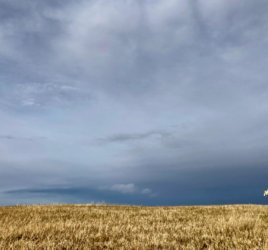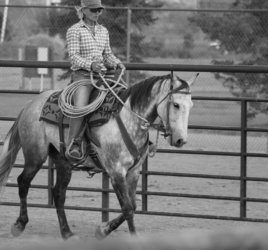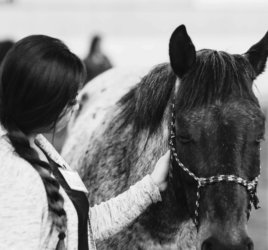The Gender Parity
 Known for the Stampede and Spruce Meadows, Calgary is a hub for international competitors and horses. At these levels of competition one can’t help but notice the number of mares represented in the final round of cattle work, that famous eight second ride or the jump- off. It is a gender parity that puts the business community to shame.
Known for the Stampede and Spruce Meadows, Calgary is a hub for international competitors and horses. At these levels of competition one can’t help but notice the number of mares represented in the final round of cattle work, that famous eight second ride or the jump- off. It is a gender parity that puts the business community to shame.
While women may be present in a higher proportion in both the workplace and the stables, there continues to be a higher representation of males in senior management and geldings in the barns. I broached this observation on an equine related discussion board and the thread quickly drifted to typical gender stereotypes, hormones, personality preferences and dominant versus passive behaviour. Similar reasons as to why mares are relegated to brood herds and women left out of the board room.
As with all my articles I seem to waller1 around for a while before I decide what it is I really want to say. Sydney helped me gain some clarity this morning. The most confident horse I have ever owned, she has never questioned her own ability. Many people who have had the opportunity to work with her have remarked “that scanning the herd she hadn’t caught their eye, but her personality is one you cannot ignore.” What I am fairly confident about is in other hands she would be labeled a difficult horse.
Just as men and women view the same problem from different angles, a mares perspective on us differs from that of a gelding. Horse clinician Julie Goodnight suggests that “working with mares requires that we develop a meaningful relationship in order for them to bond with us as they would a herd mate.”
It is coming to understand this different perspective that has helped me grow in my horsemanship skills. A mare asks more of us as a leader and it is this questioning style that often puts people at odds with mares. The mindset of many horse owners is they should just do as I ask but, as we have seen time and again in our sessions, what we think we are asking and what the horse reads are often two completely different requests.
Thinking about how mares have been stereotyped what surprises me is how often I have heard from a women “they would never ride a mare.” A participant of a recent session couldn’t have framed it better when reflecting on his experience with lead mare Zoe “she was clearly allowing me to lead her”. He held no illusion that he was the leader simply because he held the lead rope. With both mares and geldings in our herd I have learned a lot about group dynamics. Every horse has learned behaviours but each has their own unique personality and background. It is the differences in the gender dynamics in the playground, the workplace and the stables that maintains a dynamic, growing and caring environment.
To update that cowboy saying on mares I would prefer to suggest “you need to engage in dialogue with a mare.” as too often a discussion ends up being one sided. Being open to a dialogue with Sydney or any of the other mares in the herd has allowed me to see what each excels at. Dialogue requires that we not only express our opinion but we that listen to other perspectives. When you find that area of common interest a mare’s loyalty is unquestionable they will truly put their heart and soul into getting you to the final round.
1-Waller – in this context is in reference to the aimless and sometimes purposeless requests we make of our horses, to the point they simply shut us out.



